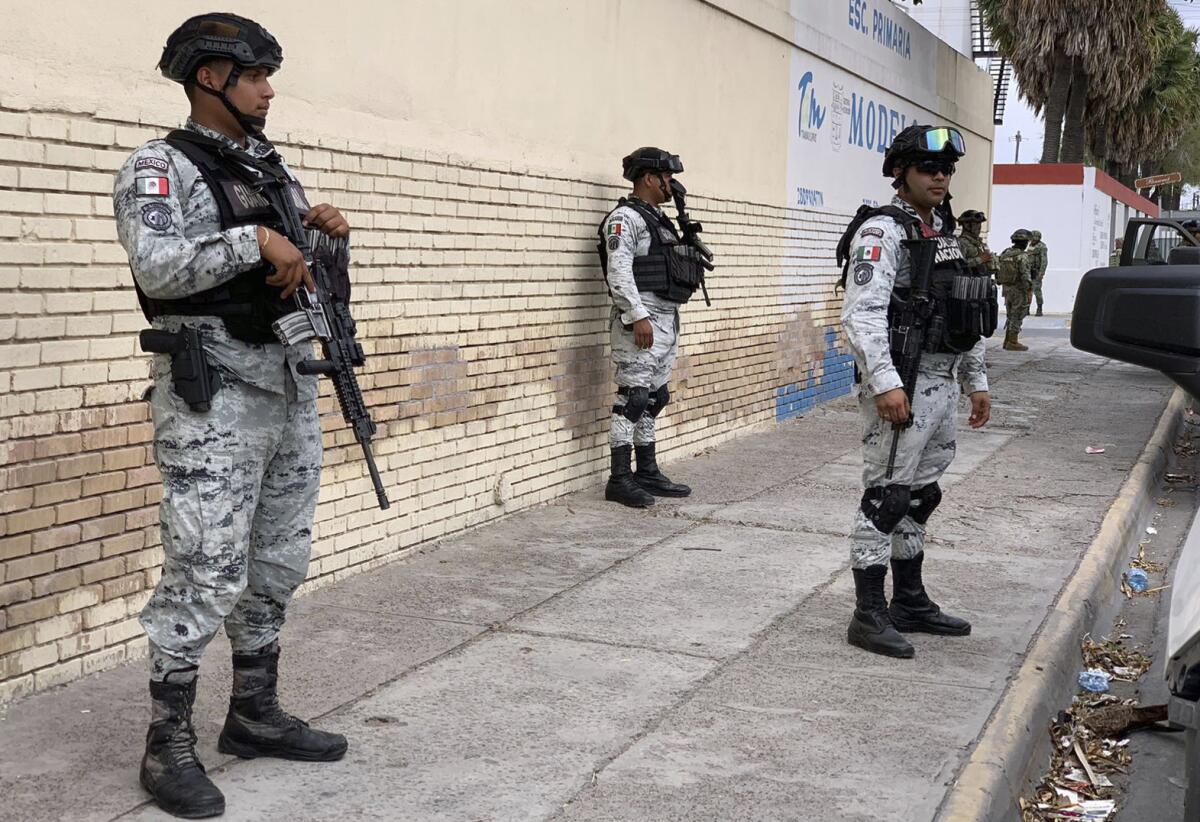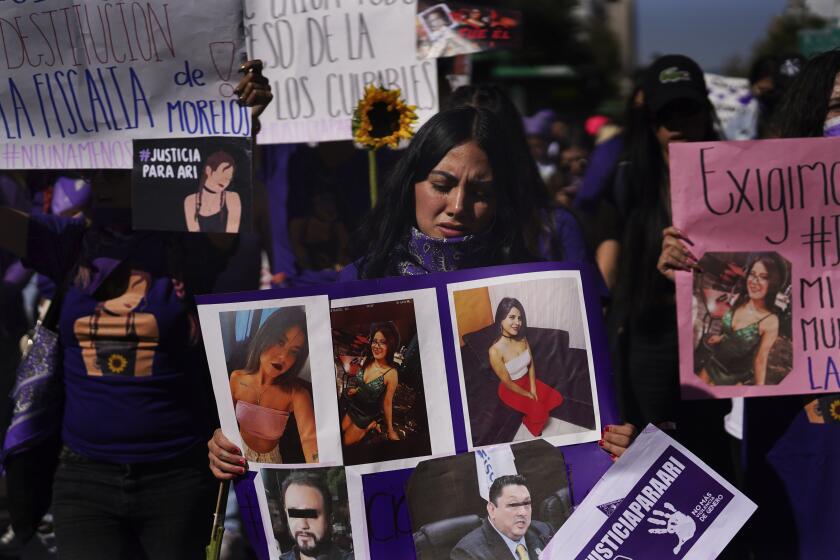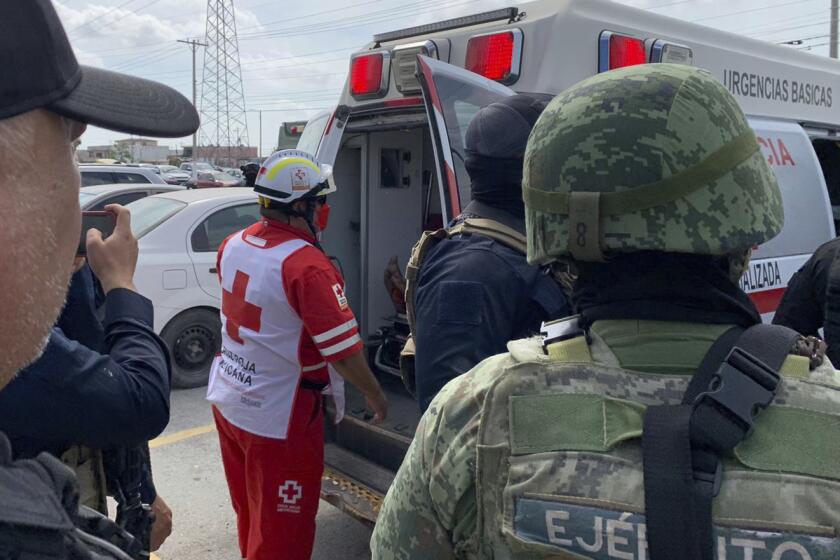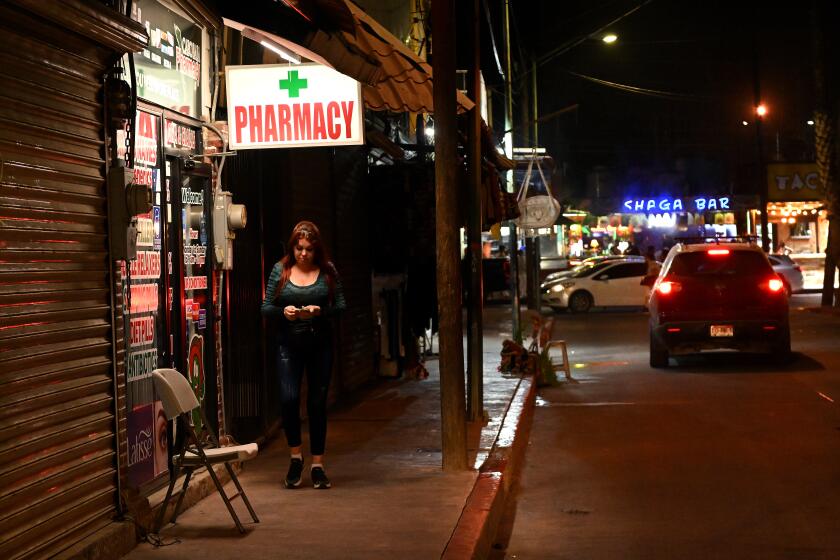Amid mounting security tensions, Mexico’s president says fentanyl is a U.S. issue

- Share via
MEXICO CITY — As investigators continued their search for the gunmen who kidnapped four Americans in the border city of Matamoros last week, Mexican President Andrés Manuel López Obrador lashed out at U.S. Republican lawmakers who have proposed sending troops into Mexico, telling them that the United States should concentrate on curbing its rampant appetite for illegal drugs.
“Why don’t you take care of your young people? Why don’t you take care of the serious problem of social decay? Why don’t [you] temper the constant increase in drug consumption?” López Obrador asked Thursday at his daily news conference.
López Obrador’s unusually sharp comments came two days after Mexican authorities rescued two of the American tourists and discovered the other two were dead. Their March 3 kidnapping in broad daylight just south of the border sparked calls for American intervention in Mexico’s fight against criminal groups.
The gruesome killing of Ariadna López shocked Mexico, spurred protests in the capital and highlighted the nation’s epidemic of violence against women.
The surviving victims, Latavia McGee, 33, and Eric James Williams, 38, were quickly transported across the border, according to Mexican authorities. The bodies of Shaeed Woodard, 33, and Zindell Brown, 28, were repatriated to the U.S. on Thursday after autopsies in Mexico, officials said.
U.S. and Mexican authorities say they still don’t know why the tourists, who entered Mexico so that McGee could undergo a medical procedure, were fired upon by several men, thrown in the back of a pickup truck and hauled away.
On Thursday, law enforcement sources in Tamaulipas state circulated a letter that appeared to be from a local drug cartel that blamed the kidnapping on several rogue members of the group.
The Associated Press cited unnamed sources who said the cartel had turned over five of its members to authorities. That has not been confirmed by Mexican authorities or the FBI, which is helping in the investigation.
Mexico kidnapping: Two Americans are killed and two are rescued after being caught in crossfire in a violent border city. It has sparked international tension.
Whatever the cause of the kidnapping, it has provoked passionate reactions on both sides of the border, inflaming a long-standing debate about who is responsible for Mexico’s rampant violence and the best way to curb it.
Republican lawmakers pointed this week to the kidnapping as further evidence of what they describe as Mexico’s lawlessness — and the U.S. need to intervene. Sen. Lindsey Graham (R-S.C.) said Wednesday that American soldiers should be authorized to enter Mexico to destroy drug laboratories.
Citing the surge in recent years of American deaths from fentanyl, most of which is smuggled from Mexico, Republican members of Congress had already been pushing a bill that would allow U.S. armed forces to fight crime south of the border. Last month, the attorneys general of 21 states asked the Biden administration to label drug cartels as terrorist groups.
The synthetic drug is the leading culprit in the U.S. opioid epidemic. Most comes from Mexico, where traffickers have embraced it over heroin.
In Mexico, that kind of rhetoric has raised eyebrows.
Mexicans have long complained that their nation has the geographic misfortune of being next to the United States, the world’s biggest consumer of illicit drugs and the site of the world’s largest stockpile of firearms.
Despite extremely strict firearms laws — there is just one gun store in all of Mexico — the country is flooded daily with weapons smuggled illegally from the United States.
A U.S.-backed effort to confront drug cartels with the Mexican military backfired, leading to an explosion of violence across Mexico that started in 2007 and continues to this day. The Mexican drug war also failed to reduce the quantity of narcotics smuggled into the United States.
López Obrador has frequently criticized Mexico’s militarized approach to combating drug trafficking, accusing his predecessors of turning the country into “a graveyard,” even though his own crime-fighting strategy hasn’t varied much from theirs in practice.
Pharmacies in several Mexican cities are selling counterfeit prescription pills laced with fentanyl and meth and passing them off as legitimate pharmaceuticals.
At his news conference Thursday, he dismissed Republican threats of U.S. military intervention as political “propaganda.”
To fight the scourge of crime and fentanyl, the president said, the U.S. should look within its own borders.
He blamed lawmakers for taking campaign donations from gun manufacturers and pharmaceutical companies that pushed American doctors to over-prescribe oxycodone and similar painkillers for years despite evidence that they cause addiction.
“We are very sorry for what is happening in the United States, but why don’t they attend to the problem?” López Obrador said. “Why don’t they fight the distribution of fentanyl in the United States, the cartels in the United States that are in charge of distributing fentanyl?
“Here we do not produce fentanyl and we do not consume fentanyl,” he insisted, despite ample evidence to the contrary.
The production of fentanyl in Mexico is well documented — a raid on a drug lab by the Mexican military in Sinaloa state last month yielded 282 pounds of fentanyl powder and 630,000 pills containing the drug. And use of fentanyl south of the border has been rising, along with overall consumption of illicit drugs, although it is nowhere near U.S. levels.
López Obrador, who is popular in Mexico and among many Mexicans living in the United States, threatened to encourage U.S. Latino voters to oppose the GOP if Republicans don’t stop their calls for military intervention.
He said his government was launching an “information campaign” to show Mexican Americans and other Latinos “how this initiative by the Republicans, in addition to being irresponsible, is an offense to the people of Mexico and shows a lack of respect for our independence and our sovereignty.”
But in Mexico, where López Obrador’s party will also face a consequential election in 2024, when voters pick his replacement, many were questioning who gets justice and why.
In this country, where the vast majority of crimes are never solved and there are 110,000 Mexicans who are missing, or “disappeared,” the quick rescue of the Americans stung.
Noting “the speed and coordination” of the kidnapping response, television journalist Ana Francisca Vega seemed to speak for many when she lamented this week the “thousands of disappeared Mexicans who have no such luck.”
Times staff writer Patrick J. McDonnell and Cecilia Sánchez Vidal in The Times’ Mexico City bureau contributed to this report.
More to Read
Sign up for Essential California
The most important California stories and recommendations in your inbox every morning.
You may occasionally receive promotional content from the Los Angeles Times.















